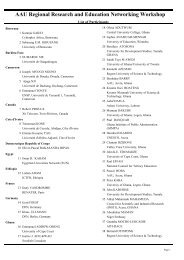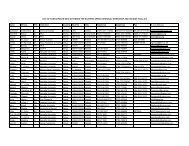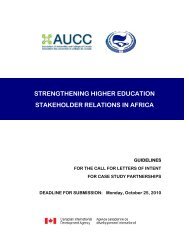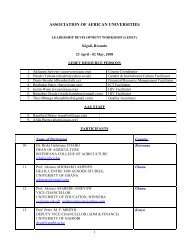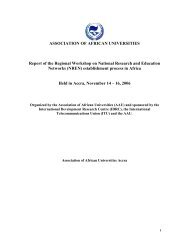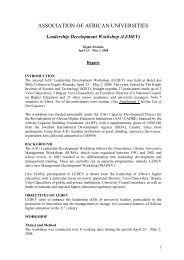international conference preserving africa's ancient manuscripts
international conference preserving africa's ancient manuscripts
international conference preserving africa's ancient manuscripts
You also want an ePaper? Increase the reach of your titles
YUMPU automatically turns print PDFs into web optimized ePapers that Google loves.
AID TRANSPARENCY (DAKAR, SENEGAL) / SAVAMA-DCI (TIMBUKTU, MALI)<br />
__________________________________________________________________________________________________<br />
INTERNATIONAL CONFERENCE<br />
PRESERVING AFRICA’S ANCIENT MANUSCRIPTS<br />
Addis Ababa,17-19 December 2010<br />
Background<br />
Aid Transparency successfully convened in Dakar (20-23 April, 2008) a regional meeting with<br />
relevant stakeholders (African librarians, conservators, researchers and decision takers) to<br />
prepare a regional Conference on Managing and Analyzing Africa’s Ancient Manuscripts. This<br />
High Level Contact Group Meeting was attended by some of the most senior public and private<br />
managers of <strong>manuscripts</strong> as well as historians and Islamic scholars. Several important decisions<br />
were taken with regard to the setting up of an inter-institutional information exchange<br />
mechanism, the venue and date of the <strong>conference</strong>, the list of participants and specific panels and<br />
thematic areas as well as the anticipated publication of a book on <strong>ancient</strong> <strong>manuscripts</strong> in Africa.<br />
West Africa is by far the largest reservoir of <strong>ancient</strong> 7 th -19 th century <strong>manuscripts</strong><br />
in the Africa region. Most of these <strong>manuscripts</strong> are kept in disastrous conditions and need special<br />
care in the areas of conservation, microfilming, digitalization, cataloguing and content analysis.<br />
There is renewed interest from the part of Africana scholars and culturalists with regard to<br />
Africa’s written treasures kept in closed family circles, mosques and Islamic centers. The<br />
convening of an <strong>international</strong> <strong>conference</strong> on the subject matter as well the publication of a<br />
landmark book on the conservation and analysis of <strong>ancient</strong> <strong>manuscripts</strong> in Africa will play a<br />
critical role for setting in motion a larger issue related to the preservation and promotion of<br />
Africa’s cultural heritage and historical treasures. Until recently, the Timbuktu <strong>manuscripts</strong> were<br />
completely ignored at world level. Thanks to several stakeholders’ interest and The Ford<br />
Foundation’s pioneering engagement in this field, many of these <strong>ancient</strong> <strong>manuscripts</strong> were<br />
systematically collected and catalogued while Timbuktu’s main public and private libraries were<br />
empowered to build capacities in the areas of cataloguing, preservation, translation of Arabic<br />
material and restoration.<br />
Objectives<br />
1. To organize an <strong>international</strong> <strong>conference</strong> on the status of Africa's Ancient Written<br />
Patrimony:<br />
a. To publish a landmark book;<br />
b. To set up an Africa-regional information exchange and learning network that<br />
will also coordinate an Africa-wide training and learning mechanism after the <strong>conference</strong>;<br />
2. To edit, document and disseminate relevant protocols developed for cataloguing,<br />
training, interpretation of content and advocating from the initial phase of the work as<br />
appropriate, especially, to strengthen the West Africa focus.
3. To launch a feasibility study for the establishment of an African Training Mechanism<br />
for Ancient Manuscripts Conservation.<br />
Coordinating Mechanisms<br />
+ The High Level Contact Group<br />
Aid Transparency successfully convened in Dakar (20-23 April, 2008) a regional meeting<br />
with relevant stakeholders (African librarians, conservators, researchers and decision takers) to<br />
prepare a regional Conference on Managing and Analyzing Africa’s Ancient Manuscripts. This<br />
High Level Contact Group Meeting was attended by some of the most senior public and private<br />
managers of <strong>manuscripts</strong> as well as historians and African heritage scholars. Several important<br />
decisions were taken with regards to the setting up of an inter-institutional information exchange<br />
mechanism, the venue and date of the <strong>conference</strong>, the list of participants and specific panels and<br />
thematic areas as well as the anticipated publication of a book on <strong>ancient</strong> <strong>manuscripts</strong> in Africa.<br />
HLCG are:<br />
Egypt<br />
Prof. Dr. Youssef Ziedan, Director, Manuscripts Center & Manuscripts Museum; The Library of<br />
Alexandria; Tel: + 2010 1704466; Fax: + 203 4820461; Ziedan@ziedan.com<br />
Dr. Abla Abd El Salam, General Director of Conservation, Egyptian Museum, Cairo; Tel: +20<br />
5762452; Fax: +20 5796974; ablaasalam@menanet.net<br />
Ethiopia<br />
Mr. Demeke Berhane, Director Manuscripts Section, Institute of Ethiopian Studies; Addis<br />
Ababa; Mob.: +251 91 1679305; demetexu@yahoo.com<br />
Ghana<br />
Dr. Seiny Moumouni, Director of Manuscripts, University of Accra; seinynir@aol.com<br />
Mali<br />
Mr. Abdel Kader Haidara, Director Savama-DCI ; Tombouctou ; Mob.: +223 6369660;<br />
savama2006@yahoo.fr<br />
Morocco<br />
Prof. Benebine Ahmed Chaouqui, Director, Royal Library; Royal Palace; Rabat ; Tel: +212<br />
(0)37763590; Fax : +212 037 763412 ; a.binebine@yahoo.fr<br />
Niger<br />
Dr Moulaye Hassane, Director of Manuscripts, IRSH Mohamed Moumouni, Niamey; Fax : (227)<br />
73 82 58; moullayehassane@yahoo.fr<br />
Nigeria<br />
Prof. Mahmoud Hamane; Prof. of History, Director Arewa House, Ahmadu Bello University,<br />
Kaduna, Nigeria; hamanmahmoud@yahoo.com<br />
Senegal<br />
2
Prof. J. Habib Sy, Director, Aid Transparency, Dakar, Senegal; Tel: +221 33 8203660;<br />
Mob.:+221775691682; mailto:Habibsy@african<strong>manuscripts</strong>.org, Habibsy@aidtransparency.org<br />
+ International Conference<br />
The International Conference on Preserving Ancient Manuscripts in Africa (17-19 December,<br />
2010, Addis Ababa) is a joint collaborative initiative between Aid Transparency, a regional<br />
policy think tank specialized in social governance, Mali’s Association for Preserving Ancient<br />
Manuscripts and Promoting Islamic Culture (Savama-Dci), the Institute of Ethiopian Studies,<br />
African museums, Librarians and research centers with The Ford Foundation’s generous<br />
financial and strategic support.<br />
A small team of eminent members of the research and knowledge management community will<br />
be responsible for the Conference’s scientific coordination. Advice and specific missions will be<br />
sought from HLCG members.<br />
+ International Exhibition<br />
The International Exhibition on Ancient Manuscripts and Writing Systems in Africa will be<br />
inaugurated on 17 December 2010 in Addis Ababa. It will take place in the historic halls of the<br />
United Nations Economic Commission for Africa in Addis Ababa in close cooperation with<br />
Ethiopia's Ministry of Culture, Council of Churches, Islamic Council, Institute of Ethiopian<br />
Studies and national museums.<br />
African and <strong>international</strong> cultural heritage institutions as well as multilateral organizations will<br />
fully participate in the operationalization of this most comprehensive exposition of Africa’s<br />
endogenous writing systems and <strong>ancient</strong> <strong>manuscripts</strong> (from the highest antiquity to the XIXth<br />
century), thus, dispelling the unfair myth that Africa never produced written historical records.<br />
This International Exhibition will be travelling throughout Africa and the world. The following<br />
cities will be targeted: Brazil; China; Egypt; France; Ghana; Great Britain; Japan; Liberia; Mali;<br />
Mauritania; Nigeria; Sierra Leone; Senegal; and South Africa; United States.<br />
The exhibition will cover the following areas: 1/ Evolution of Africa’s writing systems (rocks;<br />
cave paintings; parchments; scrolls; papyrus; paper); 2/ Presentation of <strong>ancient</strong> <strong>manuscripts</strong> from<br />
a wide range of African countries dating back – 4 000 years to the XIXth century; 3/ Presentation<br />
of relevant original or copied <strong>ancient</strong> <strong>manuscripts</strong>, photographs and artifacts; 4/ demonstrations<br />
of calligraphic skills by African crafts men and women; 4/ sale of copies of <strong>ancient</strong> <strong>manuscripts</strong><br />
and rare books provided by participant private libraries as well as some of the latest books<br />
published on Africa’s <strong>ancient</strong> <strong>manuscripts</strong> and history.<br />
A selected number of librarians and crafts men and women will be sponsored so that they can<br />
showcase their <strong>ancient</strong> <strong>manuscripts</strong> and artifacts.<br />
A Steering Committee of 4 members will coordinate the organization of this Exhibition.<br />
Networks<br />
3
African and <strong>international</strong> networks of librarians, keepers of <strong>ancient</strong> <strong>manuscripts</strong>, museums,<br />
knowledge industries, think tanks, universities, private sector and African public decision-takers<br />
at the highest level will participate in an unprecedented effort to re-assess the fate of Africa’s<br />
<strong>ancient</strong> <strong>manuscripts</strong>, to analyze on a significant scale the content of these <strong>ancient</strong> written<br />
treasures, to empower the private keepers of <strong>ancient</strong> <strong>manuscripts</strong> in whose care most of these<br />
early written records remain, and to develop sustainable preservation and financial strategies and<br />
support systems in order to optimize the life span and utilization of Africa’s <strong>ancient</strong> <strong>manuscripts</strong>.<br />
Partners<br />
International bilateral and multilateral institutions, regional cultural organizations, <strong>international</strong><br />
and African private and philanthropic sectors, African and <strong>international</strong> research institutions and<br />
museums will be asked to bring different kinds of financial and technical support.<br />
The 2010 International Conference<br />
• Conference Highlights<br />
The International Conference on Preserving Ancient Manuscripts in Africa will bring together<br />
African and <strong>international</strong> senior librarians/information sciences managers, researchers, private<br />
and public managers of <strong>ancient</strong> <strong>manuscripts</strong>, knowledge industries, decision takers, civil society<br />
and <strong>international</strong> organizations.<br />
This wide array of expertise will set itself the task of analyzing the most salient issues raised by<br />
Africa’s <strong>ancient</strong> written treasures and historical records. In addition, it will suggest concrete<br />
solutions and set up mechanisms aimed at building professional and financial capacities of<br />
private libraries and closed family circles who are the keepers of most of the continent’s <strong>ancient</strong><br />
<strong>manuscripts</strong>. Several <strong>international</strong> gatherings have already called the <strong>international</strong> community’s<br />
attention on the dismal state of Africa’s written <strong>ancient</strong> <strong>manuscripts</strong> whether in the East Cost, the<br />
Sudanic-Sahelian area, the Chadian basin, the Maghreb in its diversity and a myriad kingdoms<br />
and empires scattered throughout one of the largest continents in the world.<br />
Africa is the fountain source of the earliest and most complete types of writing systems and<br />
alphabets. It still retains several alphabets including newly created ones. Since the highest<br />
antiquity, African Pharaonic Egypt revolutionized mankind’s evolution through the most<br />
startling inventions including elaborate hieroglyphs at least 5000 years old way before its<br />
appearance in other cultural cradles.<br />
Africa’s written treasures kept in adverse conditions are at present in great danger of being lost<br />
forever if bold action is not undertaken now to preserve <strong>ancient</strong> <strong>manuscripts</strong>, offer <strong>manuscripts</strong><br />
keepers sustainable ways for generating income from their cultural treasures, taking appropriate<br />
legal steps to protect this cultural heritage and promote innovative ways for involving private and<br />
philanthropic institutions as well as the <strong>international</strong> community of donors and States.<br />
The rehabilitation of these most endangered world cultural heritage sites and written treasures<br />
deserves special attention because they are the repositories of <strong>ancient</strong> knowledge still vital for an<br />
understanding of Africa and world civilization’s past, present and future. They represent a key<br />
platform for a genuine dialogue of civilizations in a global era dangerously threatened by all<br />
kinds of challenges.<br />
4
• Background<br />
Over the past decades several meetings were held on the preservation and analysis of <strong>ancient</strong><br />
African <strong>manuscripts</strong> either in Africa (Senegal; Ghana; Ethiopia; Egypt; Timbuktu, Mali; Cape<br />
Town, South Africa; Morocco; etc) or elsewhere (Paris, London, New York, Washington, D.C.,<br />
Belgium; Spain; Oslo, Norway; etc). Many <strong>international</strong> institutions including the Unesco, Al<br />
Furqan, the International Association of Librarians, Ilesco, Isesco, The Ford Foundation, The<br />
Mellon Foundation and academic institutions in Africa and throughout the world also called on<br />
global attention on the alarming state of <strong>ancient</strong> <strong>manuscripts</strong> in Africa. A few stakeholders<br />
started cataloging, indexing and seldom restoring <strong>manuscripts</strong> in most need of repair and utmost<br />
care.<br />
The Ford Foundation assisted the Ahmed Baba Centre in Timbuktu, the Lamu library in Kenya,<br />
the Institute of Ethiopian Studies in Addis Abeba, Arewa House in Kaduna, Cape Town<br />
University in South Africa, Northwestern University in the United States of America and a<br />
Malian network of private non professional librarians in setting up their first electronic data<br />
bases and cataloguing, restoring and analyzing some of the <strong>ancient</strong> <strong>manuscripts</strong> kept in West<br />
Africa. In the past three years, The Ford Foundation supported Timbuktu’s private libraries with<br />
technical backstopping provided by Aid Transparency.<br />
• Thematic areas<br />
This three-day International Conference will bring together respected scholars, field specialists<br />
and practitioners raising central issues and suggesting practical solutions for promoting<br />
<strong>manuscripts</strong> keepers and <strong>preserving</strong> existing collections. The program will be comprised of three<br />
parallel sessions: a/ Research related to <strong>ancient</strong> <strong>manuscripts</strong> content and historical significance;<br />
b/ Preservation, cataloguing, digitization and restoration issues; c/ Knowledge management and<br />
financial capacity building.<br />
• Conference Format<br />
The Conference will host 3 keynote lectures and will select a maximum of 15 presentations and 6<br />
session chairs and rapporteurs. During the first day, maximum interaction amongst participants<br />
will be encouraged. On Day 2, there will be a Philanthropy Dinner Award honoring best<br />
practices on <strong>manuscripts</strong> preservation and scholarship. A Jury of Peers will select candidates<br />
who will be eligible for the Award (a plain bronze sculpture and a check). On the second day<br />
rapporteurs will present summaries of discussions and participants will present their amendments<br />
and final recommendations during the final plenary session.<br />
Participants will have the opportunity to attend the inauguration of an International Exhibition on<br />
Ancient Manuscripts and Writing Systems in Africa at Un-Eca in Addis Ababa. At this<br />
exhibition they will be able to interact with African craft men and women specialized in<br />
<strong>manuscripts</strong> copying, calligraphic art, books binding and cultural artifacts. They will also be<br />
given an opportunity to visit a few cultural sites in Addis Ababa.<br />
Simultaneous interpretation in English, Arabic and French will be available.<br />
• Participants<br />
5
There will be a maximum of 60 invited participants and perhaps more depending on the<br />
availability of financial sponsoring. Invited librarians and speakers from Africa will be<br />
sponsored (return tickets, accommodation and food).<br />
• Accommodations<br />
Participants will benefit from preferential rates in two hotels (Intercontinental Hotel and Jupiter<br />
Hotel) at walking distance from the United Nations Economic Commission for Africa where the<br />
Conference and Exhibition will take place.<br />
• Call for papers<br />
This announcement will be circulated as widely as possible in relevant institutions. Contributors<br />
will be asked to send a CV and an abstract of 200 words summarizing salient methodological and<br />
analytical approaches. The deadline for abstracts submission is 30 October 2009. All documents<br />
should be sent to the Steering Committee at the following email address:<br />
Scommittee@african<strong>manuscripts</strong>.org. Selected authors will be informed and will receive<br />
information on the editorial format they will be using. Deadline for papers submission will be 30<br />
March 2010. Commissioned papers will cover research expenses and honoraria. All papers will<br />
be peer-reviewed and published in a book format that will be available prior to the International<br />
Conference.<br />
• Steering Committee Members<br />
1. Professor Djibril Tamsir Niane, Historian, former co-Coordinator of UNESCO’s General<br />
History of Africa and Chancellor, University of Conakry (Guinee; Conakry)<br />
2. Professor Aboubacry Moussa Lam, Senior Egyptologist and Historian, Department of History,<br />
Cheikh Anta Diop University, Dakar, Senegal<br />
3. Professor Dr. Youssef Ziedan, Director, Manuscripts Center and Manuscripts Museum; The<br />
Library of Alexandria, Egypt<br />
4. Prof. Benebine Ahmed Chaouqui, Director, Royal Library; Royal Palace; Rabat ;<br />
5. Professor Mahmoud Hammane; Prof. of History, Director Arewa House, Ahmadu Bello<br />
University, Kaduna, Nigeria.<br />
6. Dr. Abla Abd El Salam, General Director of Conservation, Egyptian Museum, Cairo;<br />
7. Mr. Demeke Berhane, Director Manuscripts Section, Institute of Ethiopian Studies; Addis<br />
Ababa;<br />
8. Dr. J. Habib Sy, Professor of Communications, Director, Aid Transparency, Dakar, Senegal<br />
Special Advisor<br />
9. Professor Ali A. Mazrui, D.Phil., (Oxon), C.B.S.; Director, Institute of Global Cultural<br />
Studies, Binghamton University, SUNY<br />
• Contacts<br />
Email: Mgmt@african<strong>manuscripts</strong>.org<br />
Postal: P.O. Box 5409 Dakar-Fann, Dakar, Senegal<br />
J. Habib Sy<br />
Tel.: +221 8203660 (office); + 221 5691682 (cell)<br />
Fax: + 221 8203667<br />
6
Registration (starts at the airport)<br />
Pre-Conference Sessions<br />
Closed Sessions<br />
DRAFT Conference Schedule<br />
Day 1<br />
• Representatives of Networks of Private Manuscripts Keepers<br />
• High Level Contact Group Brainstorming<br />
• Strategic and Sustainable Capacity Building and Financial Partnership Brainstorming:<br />
Existing Support Programs, Financial Mechanisms and Pledges<br />
Day 2<br />
8:30 am Opening Ceremony: International Exhibition on Ancient Manuscripts in Africa<br />
� Welcome Address<br />
� Brief Speeches<br />
� Keynote adress<br />
9:30 am Official Opening of the International Exhibition on Ancient Manuscripts and<br />
Writing Systems in Africa<br />
10:30-10:45 Break<br />
Parallel Sessions<br />
10:45-12:15: Presentations 12:15-12:45: Discussions<br />
Thematic Area 1: Conservation<br />
Panel 1: Radioscopy of Collections and the Challenges of Preservation (cataloguing;<br />
restoration; digitization)<br />
Chair: ; Rapporteur: ; Panelists:<br />
Working Papers:<br />
North Africa: Egypt; Libya; Morocco; Sudan<br />
West Africa: Cameroun; Ghana; Guinea Conakry; Liberia; Mauritania; Mali; Niger; Nigeria;<br />
Senegal; Sierra Leone<br />
Central Africa: Chad<br />
Horn of Africa: Ethiopia<br />
7
East Africa: Kenya; Tanzania<br />
Institutions of Oriental and African Studies: London School of Oriental Studies; CNRS, Paris;<br />
African Studies Dept, Univ. of Pennsylvania; University of Cape Town, South Africa<br />
Panel 2: Existing Conservation Protocols and Learning Tools/Local Responses to<br />
Conservation Challenges and Intellectual Property Rights<br />
Chair: ; Rapporteur: ; Panelists:<br />
Working Papers<br />
a/ Presentation of a Training Manual for African Private Libraries;<br />
b/ Review of UNESCO Manuscripts Protocols<br />
c/ Cultural Heritage Legal Frameworks in West Africa: A Comparative Assessment<br />
Lunch Break<br />
12:45-14:00<br />
Thematic Area 2: Research<br />
Parallel Sessions<br />
14:00-15:30: Presentations 15:45-16:30: Discussions<br />
Panel 3: Research, Transliteration and Content Analysis of Ancient Manuscripts<br />
Chair: ; Rapporteur: ; 5 Panelists:<br />
Working Papers<br />
a/ Arabic scriptures and Ajami: Chad; Ghana; Mali; Mauritania; Niger; Nigeria; Senegal; Sudan;<br />
Kenya<br />
b/ African scriptures: Cameroun; Congo; Egypt; Ethiopia; Liberia; Sierra Leone; Ivory Coast<br />
c/ Africa’s intellectual and scientific achievements: A historical Survey; Heritage Literature in a<br />
selected number of countries (Ethiopia; Egypt; Mali; Mauritania; Morocco; Nigeria and Senegal)<br />
d/ Case Studies on Ancient Manuscripts in Ethiopia; Mali, Mauritania, Nigeria, Senegal, Niger,<br />
Kenya<br />
e/ Bibliographic Survey on Ancient Manuscripts in Africa:<br />
Tea/Coffee Break<br />
15:30-15:45<br />
Thematic Area 3: Sustainable Financial Capacity Building<br />
1/ Ancient Manuscripts in Africa: A Blind Spot in International Grant Making: Chair: ;<br />
Rapporteur ; Panelists:<br />
Working Papers<br />
a/ Feasibility Study on Setting Up a West African Training Centre for Manuscripts Preservation.<br />
b/ Integrating the Content of Ancient Manuscripts in Existing Educational Systems.<br />
e/ Capacity building in transliterating <strong>ancient</strong> <strong>manuscripts</strong>: operational models<br />
8
d/ A Strategic Framework for Sustainable Financial Support For Ancient Manuscripts<br />
Preservation<br />
e/ International Partnership and the African Archival Crisis: A Road Map for Coherence,<br />
Innovation and Dialogue<br />
f/ Museums: A Case for Renewed Partnership With Libraries<br />
g/ Empowering Small Libraries: A Key to Sustainable Preservation<br />
h/ Private Sector Involvement: Which Way Forward?<br />
17:00-19:00: Visit of Cultural Sites in the Addis Ababa Area (Optional)<br />
Philanthropy Dinner and Awards<br />
20:00-23:00<br />
• Introduction<br />
• 15 minutes Video Show on Imperiled Ancient Manuscripts Throughout Africa<br />
• Traditional Ethiopian Musical Show<br />
• Brief speeches by a selected number of private librarians and researchers (3 minutes per<br />
speaker)<br />
• Ancient Manuscripts Best Practice Preservation Awards by a Jury of Peers<br />
• Keynote address<br />
Day 3<br />
Plenary Sessions<br />
9:00-11:30: Rapporteurs’ Reports and Recommendations<br />
Tea/Coffee Break<br />
11:30-11:45<br />
11:45-12:30: Adoption of an African Charter on the Preservation of African Manuscripts<br />
12:30-13:00: Adoption of a Strategic Plan for: a/ Training on Preserving Ancient Manuscripts in<br />
Africa; b/ Information Exchange and Analysis on Ancient Manuscripts in Africa; c/ Sponsorship<br />
for the Restoration of Ancient Manuscripts in Africa<br />
Closing Session (Final Speeches)<br />
13:00-13:30<br />
Lunch<br />
13:30-15:00<br />
9
Cultural touring, Addis Ababa (optional)<br />
_____________________________________________________________________________________________<br />
AFRICAN UNION<br />
AID TRANSPARENCY (DAKAR, SENEGAL)<br />
AREWA HOUSE (KADUNA, NIGERIA)<br />
DÉPARTEMENT DE MANUSCRITS ARABES ET AJAMIS, INSTITUT DE<br />
RECHERCHES EN SCIENCES HUMAINES, UNIVERSITÉ ABDOU MOUMOUNI,<br />
(NIAMEY, NIGER)<br />
ETHIOPIAN ORTHODOX CHURCH (ADDIS ABABA)<br />
INSTITUT DES HAUTES ETUDES ET DE RECHERCHES<br />
ISLAMIQUES AHMAD BABA (TIMBUKTU, MALI)<br />
INSTITUTE OF ETHIOPIAN STUDIES<br />
ADDIS ABABA UNIVERSITY<br />
ISLAMIC AFFAIRS SUPREME COUNCIL, ETHIOPIA<br />
MINISTRY OF CULTURE AND TOURISM, ETHIOPIA<br />
SAVAMA-DCI (TIMBUKTU, MALI)<br />
THE FORD FOUNDATION<br />
UNITED NATIONS ECONOMIC COMMISSION FOR AFRICA<br />
10



